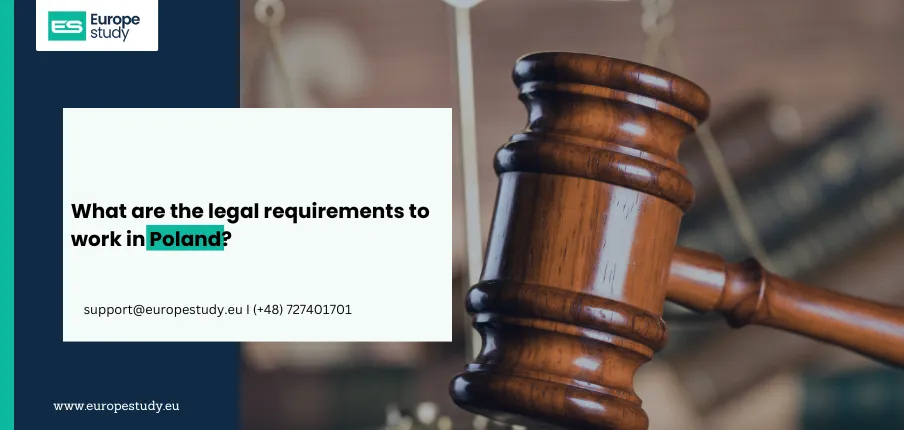
What are the legal requirements to work in Poland?
Poland has become an increasingly attractive destination for foreign workers due to its growing economy, relatively low cost of living, and central location in Europe. Whether you're a skilled professional, a manual laborer, or a recent graduate, Poland offers a wide range of opportunities. However, to work legally in Poland, you must meet specific legal requirements. This guide breaks down everything you need to know.
1. Determine Your Eligibility
Before applying for any job, it’s important to identify your legal status and eligibility. There are different rules for:
- EU/EEA citizens
- Non-EU/EEA citizens (third-country nationals)
EU/EEA Citizens
Citizens of the European Union (EU), European Economic Area (EEA), and Switzerland do not need a work permit to work in Poland. They can work freely, though registration with local authorities is still required for long-term stays.
Non-EU/EEA Citizens
Most third-country nationals will need both a work permit and a residence visa or permit.
2. Types of Work Permits in Poland
Poland offers several types of work permits depending on the nature of employment:
- Type A: For foreigners employed by a Polish company (most common).
- Type B: For foreigners who serve as board members and are in Poland for over 6 months in a 12-month period.
- Type C: For intra-company transfers (foreign company assigning staff to Poland).
- Type D: For foreigners working for a foreign employer but providing export services in Poland.
- Type E: For other cases not covered above.
Work permits are usually issued for up to 3 years (renewable) and are employer-specific—you cannot switch jobs freely without applying for a new permit.
3. The Role of the Employer
In most cases, your employer must apply for the work permit on your behalf. They need to:
- Prove there are no qualified Polish or EU workers available for the job (a labor market test may be required).
- Submit the application to the Voivodeship Office (Urząd Wojewódzki) in the region where the work will be performed.
- Pay applicable fees and provide documentation (e.g., company registration, employment contract, and justification for hiring a foreigner).
4. Residence Permit (Temporary Stay)
In addition to a work permit, non-EU/EEA citizens need to apply for a Temporary Residence Permit (Karta Pobytu), which allows you to legally live in Poland. This application must include:
- A valid passport
- Proof of employment (work permit or job offer)
- Proof of accommodation
- Health insurance
- Evidence of sufficient financial means
Temporary residence permits are typically issued for up to 3 years, depending on your contract and other factors.
5. Visa Requirements
If you’re applying from outside Poland, you may need to apply for a National Visa (Type D) at your nearest Polish consulate. The visa is usually granted based on a valid work permit or job offer and allows you to enter Poland legally.
Once in Poland, you can convert this visa into a residence permit for longer stays.
6. Special Procedures and Exceptions
- Seasonal Work Permit: For short-term jobs (up to 9 months) in agriculture, tourism, or hospitality.
- Declaration of Employment (Oświadczenie): For citizens of specific countries (e.g., Ukraine, Georgia, Moldova) to work in Poland for up to 24 months without a formal work permit, but under a simplified process.
- Blue Card: For highly skilled non-EU professionals in certain industries (IT, engineering, etc.). It allows easier mobility within the EU and longer residence.
7. Registration with Local Authorities
Once in Poland, you must:
- Register your address (zameldowanie) with the local city office (Urząd Miasta or Gminy)
- Get a PESEL number (national identification number)
- Open a Polish bank account (optional but helpful for salary payments)
8. Penalties for Working Illegally
Working without a valid permit or visa can result in:
- Fines for the employee and employer
- Deportation and entry bans
- Difficulty reapplying for legal stay in the future
Always ensure your documentation is up to date and legally compliant.
Final Thoughts
Working legally in Poland requires careful attention to immigration rules, paperwork, and deadlines. While the process can be complex, it’s manageable with proper guidance and a willing employer. If you're planning to work in Poland, begin by securing a job offer and confirming that your prospective employer is experienced with hiring foreign workers. From there, follow the appropriate application steps and maintain legal status during your stay.





